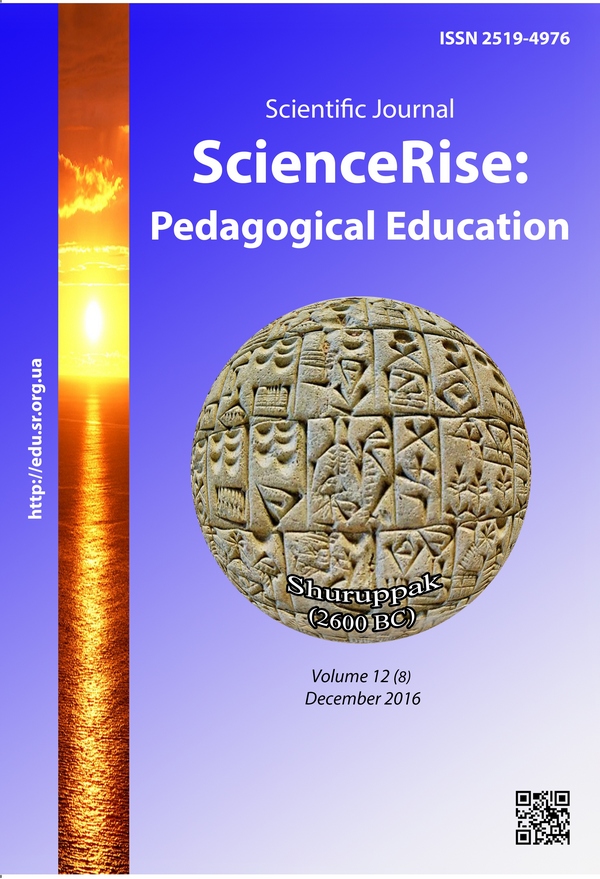Elaboration of the system of competences of environmental monitoring in future specialists
DOI:
https://doi.org/10.15587/2519-4984.2016.87752Keywords:
environmental monitoring, learning-upbringing process, types of control, binary assessment, teaching activityAbstract
The necessity of elaboration of the system of diagnostics of competences of environmental monitoring in future specialists is elucidated in the article. The types and methods of control, on which base has been formed the structural-logic scheme of their use at the study of discipline “Environmental monitoring”, were characterized. Three levels of control were separated in the system of diagnostics of competences of environmental monitoring were separated: income, intermediate, final – their problem-thematic coordination was established in means and diagnostic criteria. The means of diagnostics of competences were improved at realization of creative, individual, scientific works of students that at first can be presented as formed interdisciplinary course project and in further – qualified diploma work that can solve the complex environmental problems, typical for the local system “Little Motherland”, of one student in particular or of the target group of students (for the solution of problems by the types nature management in the fields of economy by the types of economic activity). It was studied, that at the expanse of using the competence approach in professional preparation of future specialists the training quality is provided with potential possibilities of its correction according to the three of aims at organization of learning-upbringing process, especially realization of individual and differential approaches in learning-cognitive and scientific activity to satisfy the socio-environmental demand of society in high-qualified specialists, able to solve professional tasks of different environmental complication and to model the environmental situation on the principles of steadiness
References
- Kremen, V. G. (Ed.) (2004). Vyshha osvita Ukrai'ny i Bolons'kyj proces. Ternopil': Navchal'na knyga-Bogdan, 384.
- Aleksejuk, A. M. (1998). Pedagogika vyshhoi' osvity Ukrai'ny. Istorija. Teorija. Kyiv: Lybid', 560.
- Vitvic'ka, S. S. (2003). Osnovy pedagogiky vyshhoi' shkoly. Metodychnyj posibnyk dlja studentiv magistratury. Kyiv: Centr navchal'noi' literatury, 316.
- Poltorac'ka, V. V., Kadaner, O. V. Kontrol' i ocinjuvannja navchal'nyh dosjagnen' studentiv v umovah modul'no-rejtyngovoi' systemy navchannja. Available at: http://www.sportpedagogy.org.ua/html/journal/2009-03/09pvvrsl.pdf
- Trygub, I. P., Nykytenko, O. V. (2012). Osoblyvosti kontrolju uspishnosti studentiv v umovah kredytno-modul'noi' systemy organizacii' navchannja. Gnozys, II (35), 309–316.
- Zhukovs'ka, A. L. (2005). Problema ocinjuvannja uspishnosti studentiv. Naukovyj poshuk molodyh doslidnykiv, 2, 101–104.
- Lysak, G. O. (2008). Kontrol' navchal'nyh dosjagnen' studentiv v umovah kredytno-transfernoi' systemy navchannja. Visnyk Zaporiz'kogo nacional'nogo universytetu, 1, 157–162.
- Nychkalo, N. G. (Ed.) (2000). Profesijna osvita: slovnyk. Kyiv: Vyshha shkola, 380.
- Mel'nychuk, I. M. (2009). Ocinjuvannja navchal'nyh dosjagnen' studentiv v suchasnyh umovah pidgotovky majbutnih fahivciv. Visnyk Nacional'noi' akademii' Derzhavnoi' prykordonnoi' sluzhby Ukrai'ny, 2, 101–112.
- Pometun, O., Pyrozhenko, L.; Pometun, O. (Ed.) (2004). Suchasnyj urok. Interaktyvni tehnologii' navchannja. Kyiv: A.S.K., 192.
- Olijnyk, P. M. (2000). Formy ta metody aktyvnogo navchannja pry pidgotovci fahivciv riznyh osvitn'o-kvalifikacijnyh rivniv i kryterii' i'h vyboru. Naukovyj visnyk Nacional'nogo agrarnogo universytetu, 30, 61–71.
Downloads
Published
How to Cite
Issue
Section
License
Copyright (c) 2016 Наталія Сергіївна Бордюг

This work is licensed under a Creative Commons Attribution 4.0 International License.
Our journal abides by the Creative Commons CC BY copyright rights and permissions for open access journals.
Authors, who are published in this journal, agree to the following conditions:
1. The authors reserve the right to authorship of the work and pass the first publication right of this work to the journal under the terms of a Creative Commons CC BY, which allows others to freely distribute the published research with the obligatory reference to the authors of the original work and the first publication of the work in this journal.
2. The authors have the right to conclude separate supplement agreements that relate to non-exclusive work distribution in the form in which it has been published by the journal (for example, to upload the work to the online storage of the journal or publish it as part of a monograph), provided that the reference to the first publication of the work in this journal is included.







